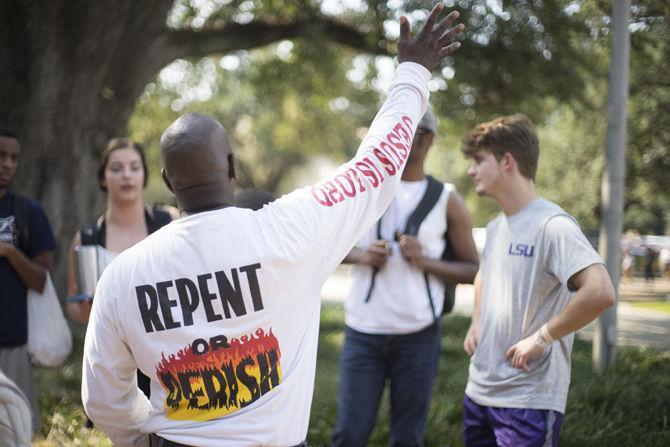Slander is not tolerated under freedom of speech. While hate speech is still protected under the First Amendment, blackening someone’s name is illegal. Everyone who visits the Student Union or passes by Free Speech Plaza knows of the dreaded “screachers,” those who preach about this or that at the top of their lungs to the chagrin of their listeners. When confronted, they hide behind both the First Amendment and University’s lack of rules.
70 percent of Americans believe hate speech should be protected according to a National Constitution Center poll. The First Amendment was designed mainly for unpopular, inflammatory opinions, but there is a line between inflammatory and contemptuous. The latter attacks someone on a personal level, and the former incites a change. When screachers are standing on elevated platforms in Free Speech Plaza labeling passersby as “whores,” “sinners” and “sluts,” they victimize students as well as assault their ears. At the very least, these ear-splitting preachers should be charged with disturbing the peace.
These verbal confrontations do not incite others to change; they only create animosity toward the preacher as well as the organization they claim to represent. Freedom of speech was created to foster innovative ideas, not violence and discrimination. If regulations to Free Speech Plaza were imposed, not only would innocent ears be spared, but those proclaiming their beliefs might gather further support by not sounding insane.
The University has insufficient regulation on free speech. In the Registered Student Organization Handbook, the University places great restriction on the distribution of printed material. Organizations must first seek approval from the Office of Campus Life before distributing pamphlets and posters. The University also has full rights to regulate its content as well as the time of distribution. However, there is no word on regulation of spoken expression. Bystanders can choose to ignore pamphlets, but they are forced to hear the screachers’ shouts. Therefore, the heavy regulation should be on the latter not the former.
The University does claim to protect the students to a degree. Following Title IX of the Education Amendments of 1972, the University prohibits “discrimination on the basis of sex and sexual misconduct” to promote “integrity, civility and mutual respect.” These values lack any defense in Free Speech Plaza and see no protection by the University. Furthermore, any facade of protection presented only encompasses sexual misconduct.
In the Faculty Senate Resolution 16-01, the University claims it will take no role to “shield individuals from ideas and opinions they find unwelcome, disagreeable or even deeply offensive.” The resolution states the University has no interest in regulating speech even to promote “civility and respect.” While this ruling could be taken as a boon to open debate and discussion, it would only work in an ideal world. There is no open discussion in Free Speech Plaza. Instead, it is a hostile environment in which a select few “holier than thou” screachers shout obscenities and criticisms to bystanders who just want to enjoy a nice day outside.
Freedom of speech is one of the most valuable liberties we have as a nation. As the world changes, so should the laws and protections meant to benefit its people. It is free speech that allows us to point out flaws in the old that injure in order to instate new laws that protect. However, it is when freedom of speech is used as a shield to protect hatred, prejudice and obscenity that reasonable regulation must be imposed. It is not a matter of disagreeing with certain ideologies but rather subduing a hostile environment.
Ethan Gilberti is a 19-year-old English sophomore from New Orleans, Louisiana.
Opinion: Free Speech Plaza creates a hostile environment
October 25, 2017
Members of the Consuming Fire Fellowship elicit a student response on Sept. 27, 2016 in Free Speech Plaza near the LSU Student Union.







